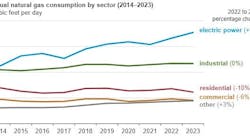Terrorist leader Osama bin Laden is out to upset the international economy and-judging by the reaction of world oil markets to recent events in Nigeria-he’s doing a good job (see story, this page).
Oil prices soared close to $60/bbl on June 20 partly on the strength of reports that bin Laden’s al-Qaeda organization had threatened the US presence in Nigeria.
Such threats can’t be ignored. After all, Nigeria is a key supplier of oil to the US-bin Laden’s archenemy-as well as to US allies in Western Europe, Asia, and Latin America.
If Nigerian President Olusegun Obasanjo has his way, Nigeria’s exports to the US will increase to 15% of US demand. That is more than enough to attract the ire of the terrorist leader and his murderous henchmen.
And the ire of those henchmen has indeed been attracted to Africa.
Bin Laden’s men
According to a United Nations report issued last February, al-Qaeda has opened recruiting and training bases in Nigeria, Somalia, Tanzania, and Uganda. In its report, the UN also warned that the terror group’s attacks should be expected to increase.
The report was written by terrorism experts appointed by the Security Council to monitor sanctions against al-Qaeda and the Taliban, the regime of radical Muslim clerics that had run Afghanistan until a US-led coalition ousted them in 2001.
Richard Barrett, a British intelligence expert and the team’s coordinator, said, “Al-Qaeda is a phenomenon that observes no borders. It is even harder to track now than it was a year or two ago when it had a more coherent structure.”
The report said al-Qaeda is looking for “new areas to expand” and has established bases in “poorly policed” areas of sub-Saharan Africa. “They are present there. The security forces of those countries agree with that,” Barrett said of Nigeria, Somalia, Tanzania, and Uganda.
Counterterror training
Elsewhere, to guard against the incursion of al-Qaeda terrorists, the US military has eased into peer-to-peer training for African militaries.
Biannual exercises, this year known as Operation Flintlock 2005, aim to be part of a broader regional effort called the Trans-Sahara Counterterrorist Initiative.
Funded to the tune of $100 million over 5 years, the initiative aims to help the African militaries mount their own counterterrorism policies while rooting out banditry and curbing clandestine immigration.
People are cooperating, too. Last week, representatives from nine African militaries-Morocco, Tunisia, Algeria, Mauritania, Mali, Niger, Nigeria, Chad, and Senegal-were in Dakar for a multinational command post exercise conducted by the US.
Such cooperation is essential given the alarming reports of the recent incursion into remote northeastern Mauritania claimed by Algeria’s Salafist Group for Preaching and Combat, which has al-Qaeda links.
But it remains to be seen whether anyone can prevent a terrorist tool that bin Laden apparently wields with ease: the infiltration of unsettling rumor into world oil markets. ✦

